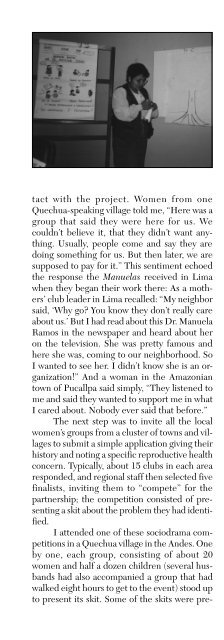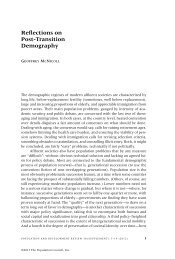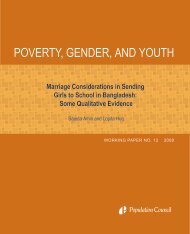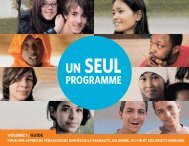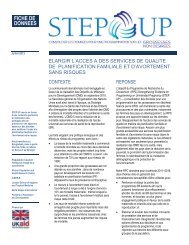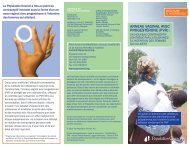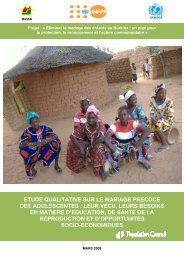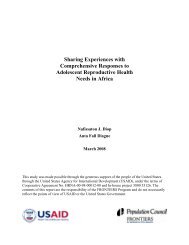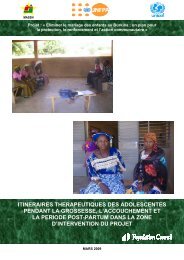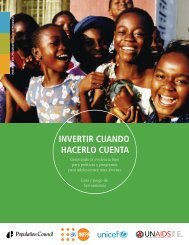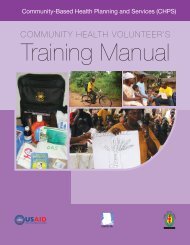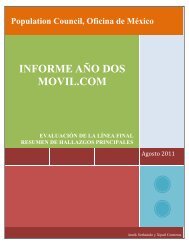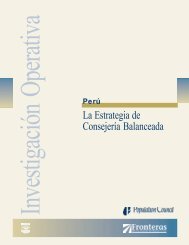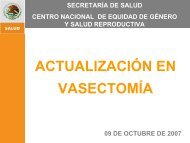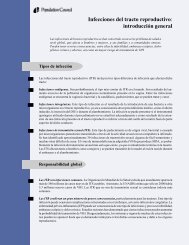QCQ# 10 Alone You are Nobody, Together We Float: The Manuela ...
QCQ# 10 Alone You are Nobody, Together We Float: The Manuela ...
QCQ# 10 Alone You are Nobody, Together We Float: The Manuela ...
You also want an ePaper? Increase the reach of your titles
YUMPU automatically turns print PDFs into web optimized ePapers that Google loves.
tact with the project. Women from one<br />
Quechua-speaking village told me, “Here was a<br />
group that said they were here for us. <strong>We</strong><br />
couldn’t believe it, that they didn’t want anything.<br />
Usually, people come and say they <strong>are</strong><br />
doing something for us. But then later, we <strong>are</strong><br />
supposed to pay for it.” This sentiment echoed<br />
the response the <strong>Manuela</strong>s received in Lima<br />
when they began their work there: As a mothers’<br />
club leader in Lima recalled: “My neighbor<br />
said, ‘Why go? <strong>You</strong> know they don’t really c<strong>are</strong><br />
about us.’ But I had read about this Dr. <strong>Manuela</strong><br />
Ramos in the newspaper and heard about her<br />
on the television. She was pretty famous and<br />
here she was, coming to our neighborhood. So<br />
I wanted to see her. I didn’t know she is an organization!”<br />
And a woman in the Amazonian<br />
town of Pucallpa said simply, “<strong>The</strong>y listened to<br />
me and said they wanted to support me in what<br />
I c<strong>are</strong>d about. <strong>Nobody</strong> ever said that before.”<br />
<strong>The</strong> next step was to invite all the local<br />
women’s groups from a cluster of towns and villages<br />
to submit a simple application giving their<br />
history and noting a specific reproductive health<br />
concern. Typically, about 15 clubs in each <strong>are</strong>a<br />
responded, and regional staff then selected five<br />
finalists, inviting them to “compete” for the<br />
partnership; the competition consisted of presenting<br />
a skit about the problem they had identified.<br />
I attended one of these sociodrama competitions<br />
in a Quechua village in the Andes. One<br />
by one, each group, consisting of about 20<br />
women and half a dozen children (several husbands<br />
had also accompanied a group that had<br />
walked eight hours to get to the event) stood up<br />
to present its skit. Some of the skits were pre-<br />
Autodiagnósticos<br />
Autodiagnósticos <strong>are</strong> a participatory<br />
research process using games and group<br />
exercises designed to help women analyze<br />
their lives, identify their health needs, and<br />
reflect on how they view their health c<strong>are</strong>.<br />
<strong>The</strong>y <strong>are</strong> led by a ReproSalud promoter<br />
using the community’s first language<br />
(Quechua or Spanish). Using the image of<br />
a tree, the group analyzes the selected<br />
problem: <strong>The</strong> tree trunk represents the<br />
problem; the branches, the consequences;<br />
the roots, the underlying causes. Carried<br />
out in three to five sessions, each lasting<br />
four hours, the autodiagnósticos <strong>are</strong> tape<br />
recorded and transcribed in such a way<br />
that the information can be analyzed and<br />
systematized as part of the project’s<br />
ethnographic research component. In this<br />
sense the autodiagnóstico seeks to<br />
develop new knowledge based on women<br />
gaining a fundamental understanding of<br />
their own lives.<br />
sented in Spanish, others in Quechua. Some<br />
dealt with the lack of adequate prenatal c<strong>are</strong>,<br />
others with the need for contraception. Some<br />
were extremely well prep<strong>are</strong>d and enacted, others<br />
a bit sloppy. But all were lively; soft-spoken<br />
women were transformed into drunken husbands,<br />
mothers giving birth, and nagging neighbors. After<br />
the presentations, lunch was served and participants<br />
were informed that they would be notified<br />
of the final decision by letter within a week.<br />
13


